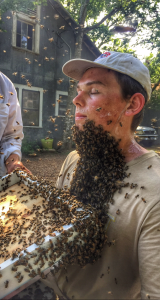There’s a lot of buzz going around among medical schools as Match 2023 season gets started.

That’s nothing new for fourth-year medical student Dylan Weaver. He comes from a long line of beekeepers.
“I remember as a kid watching my father and his team of beekeepers raising queen bees,” Weaver said. “I have pretty vivid memories of that from a very young age. I was able to lend a hand starting in high school especially during the busy part of the year.”
His parents run a business called BeeWeaver Honey Farm in Navasota, Texas, about a two-hour drive from Austin. The family’s roots in beekeeping date back to 1888 when Weaver’s great-great uncle collected bees from a tree and bought a few more to start producing honey. He gave Weaver’s great-great grandparents a swarm of 10 colonies as a wedding gift.
“They took that swarm and then bought some other hives,” Weaver said. “Ever since then, there have been beekeepers in our family.”
His parents have hundreds of bees and Weaver has a few hives of his own in Austin, where his family moved when he was in middle school. He started a beekeeping club in his second year at Texas Medical Branch in Galveston. The members used four hives at Galveston Health Center to help disadvantaged people learn more about the craft.
“We were able to take care of these beehives for them and help people who had cerebral palsy and other disabilities enjoy beekeeping and see what it was about,” Weaver said. “I also got to teach quite a few people in and outside the medical school some basics about beekeeping such as lighting a smoker, how to use the hive tool to properly get into the hive, how to check the brew nest, how to look for the queen, and some of the basic tools you need to be able to keep your own bees.”
There’s a Medical Tie
His beekeeping experience also has aided his medical studies.
“When you open a hive and you’re trying to figure out, ‘Oh, what does this hive need? Is it going to need some extra food? Does it need a new queen? Do we need to do something about mites or hive beetles? Do we need to go in and split it?’” he said. “When you go in, you’re almost trying to make a diagnosis and treatment plan. It’s a little bit similar to medicine in that way.”
There are hazards to the work. The bees are mostly docile, but Weaver has been stung a few times.
“More times than I care to count,” he said. “It just comes with the territory. It’s honestly not that bad.”
Staying calm is the key, which is also good advice for someone who plans to become either a diagnostic or interventional radiologist.
“Anytime you get a little freaked out, you can freak out the bees and that’s never fun,” Weaver said. “No matter how much protection you have, it’s always a lot more fun to do your beekeeping with a calm hive and just be patient and move slowly through it as opposed to causing a disturbance. It’s a lot more fun that way and it becomes a much more therapeutic and enjoyable experience as opposed to a chore.”
Weaver recently posted a “bee beard” photo on his Twitter account. In the shot, he used the queen bee to attract the other hive members. Weaver had the queen bee in a small cage around his neck. His only protection was a little Vaseline to discourage the bees from getting near his eyes or nose.
Taking the photo without using beekeeping gear understandably made him nervous. It also created an incredible, and maybe uncomfortable, image.
“Even with all my beekeeping experience, it’s still a lot to be unprotected and just let them crawl over your chin and neck like that,” he said. “It was a little disconcerting.”
A Connection is Made
Fittingly, beekeeping stoked Weaver’s interest in medicine. When his parents sold a cardiologist a package of bees when Weaver was a high school senior, they told him their son was looking into medicine. The cardiologist followed up with Weaver and allowed the youngster to shadow his work at the hospital.
A couple of years later in medical school, Weaver changed his focus to radiology.
“I think it’s pretty neat that this whole journey started because of beekeeping,” Weaver said.
After graduating next spring, Weaver plans to perform a residency. He and his fiancée, Gisela Gonzalez, are going through the Match process; she’s in psychiatry. They earned their undergraduate degrees from Southwestern University in Georgetown, Texas, and hope to match together.
“We just want to find an area where it would be a good fit and we could bring my dog,” he said. “We’re looking right now and, so far, we’ve been pretty impressed with the programs that we have talked to.”
Bees also figure into his long-term plans. Family history plays a significant role.
“I always want to have some bees around … at least a few hives,” he said. “It’s a fun way to get outside and it has been in my family for so long, I feel like it almost would be disrespectful to them if I didn’t have at least one hive.”
Weaver just won’t be able to have Gonzalez very involved.
“I recently found out that my fiancée is allergic, so we’re going to be very careful,” Weaver said. “We’ll always have an EpiPen handy.”


